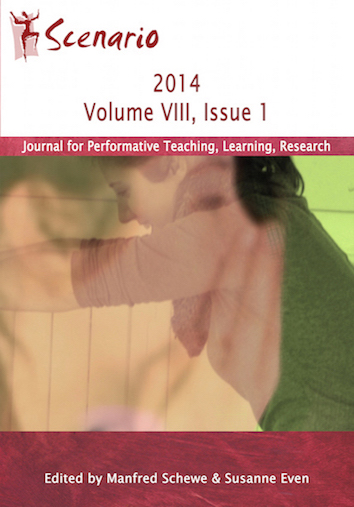Drama in SPRACHPRAXIS at a German University English Department: Practical Solutions to Pedagogical Challenges
DOI:
https://doi.org/10.33178/scenario.8.1.3Abstract
This article describes the initial phase of incorporating drama-in-education classes into the practical language curriculum of a German university English department. It offers a brief overview of drama in (higher) education, before focusing on some recent developments in Germany and the UK: specifically the current increase of interest in Theaterpädagogik in Germany, and the incorporation of performative pedagogy in UK higher education, with the example of an initiative at the University of Warwick. The practical language curriculum of the University of Tübingen English Department, within which the drama classes are being run, is introduced. A report on one of the classes is provided, with a short example of a student-led presentation session. After investigating some student feedback from the class, the article concludes by suggesting that a drama approach offers solutions to some challenges posed by the curriculum, and explains a brief rationale for its further development in this context.References
Balme, Christopher (2008): The Cambridge Introduction to Theatre Studies. Cambridge: Cambridge University Press
Boal, Augusto (1985): Theatre of the Oppressed. New York: TGC
Boal, Augusto (2002): Games for Actors and Non-Actors. New York: Routledge
Bolton, Gavin (1979): Towards a Theory of Drama in Education. London: Longman
Chillington-Rutter, Carol; Heron, Jonathan; Monk, Nicholas; Neelands, Jonothan (2011): Open-Space Learning: A Study in Transdisciplinary Pedagogy. London: Bloomsbury
Fleming, Michael (1998): Cultural awareness and dramatic art forms. In: Byram, Michael; Fleming, Michael (eds): Language Learning in Intercultural Perspective: Approaches through drama and ethnography. Cambridge: Cambridge University Press
Fonio, Fillipo & Genicot, Geneviève (2011): The Compatibility of Drama Language Teaching and CEFR Objectives. Observations on a Rationale for an Artistic Approach to Foreign Language Teaching at an Academic Level. In: Scenario V/2, 75-89
Haack, Adrian (2010): KünstlerInnen der improvisierten Aufführung. Performative Fremdsprachendidaktik als Teil des Lehramtsstudiums. In: Scenario IV/1, 35-53
Haack, Adrian & Carola Surkamp (2011): ‚Theatermachen‘ inszenieren. Dramapädagogische Methoden in der Lehrerbildung. In: Küppers, Almut, Torben Schmidt & Maik Walter (eds.) (2011): Inszenierungen im Fremdsprachenunterricht. Grundlagen, Formen, Perspektiven. Braunschweig: Diesterweg, 53-67
Hornbrook, David (1998): Education and Dramatic Art. London: Routledge
Monk, Nicholas: Interview (http://www2.warwick.ac.uk/fac/cross_fac/capital/teaching_and_learning/materials/conversations/nickandjonny.mp4)
Prendergast, Monica; Saxton Juliana (2013): Applied Drama. Bristol: Intellect
Rutter, Carol: Interview (http://www2.warwick.ac.uk/fac/cross_fac/capital/lightbox/player.swf?url=http://www2.warwick.ac.uk/fac/cross_fac/capital/001overview_1.flv)
Schewe, Manfred (2013): Taking stock and looking ahead: Drama Pedagogy as a Gateway to a Performative Teaching and Learning Culture. In: Scenario VII/1, 5-28
Wildt, Beatrix, Ingrid Hentschel & Johannes Wildt (eds.) (2008): Theater in der Lehre. Verfahren, Konzepte, Vorschläge. Berlin/Zürich: LIT
Woodward, Tessa (2003): Key Concepts in ELT: Loop Input. In: ELT Journal 57/3, 301-304
Published
Issue
Section
License
Copyright (c) 2014 the author(s)

This work is licensed under a Creative Commons Attribution-NonCommercial-NoDerivatives 4.0 International License.



